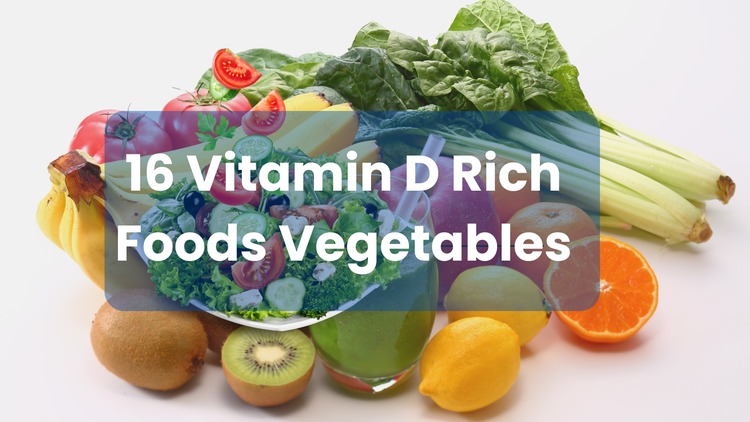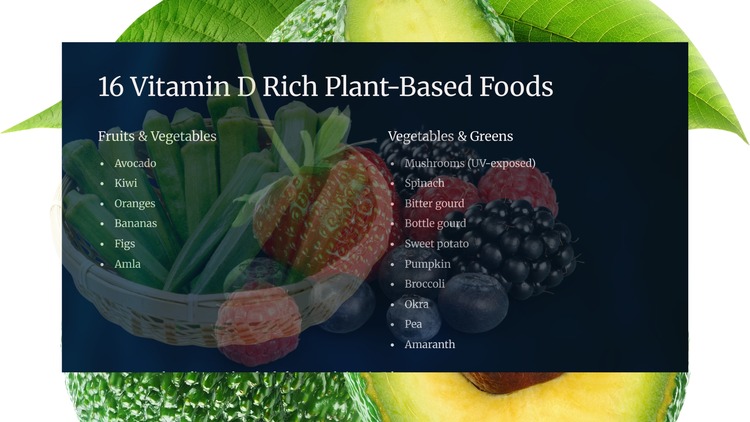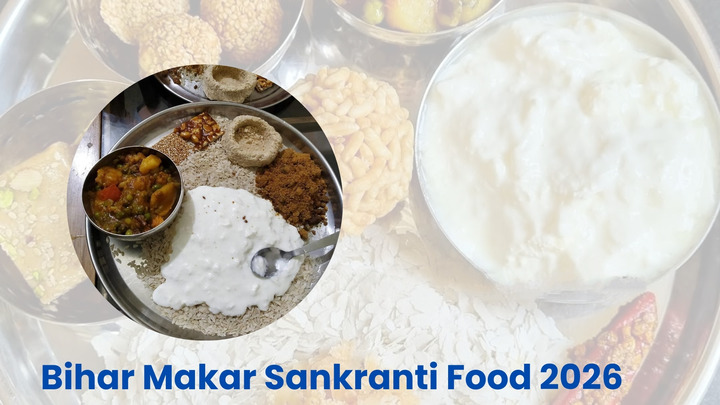
Vitamin D, commonly referred to as the “sunshine vitamin”, is an essential nutrient that supports the development of healthy bones, assists in maintaining the immune system, and is involved in mood regulation. Though sunlight exposure is the main source of vitamin D, many people don’t have enough because of their indoor lifestyles or cloudy climates. Fortunately, some foods and vegetables also pack a good amount of this vital nutrient. Here are 16 healthy vitamin D rich foods and vegetables to include in your diet for overall better health and wellness.

Avocado
An avocado is a highly nutritous fruit containing healthy fat, fiber and even a little vitamin D, all which assist the body in the efficient absorption of fat soluable vitamins including D.
Kiwi
This bright green fruit, often associated with a high water content and rich in vitamin C, also has small amounts of vitamin D, making it a great addition to your breakfast or smoothie.
Oranges
Oranges themselves don’t contain a lot of vitamin D, but many commercially available orange juices have been fortified with it. A glass of fortified orange juice could be a delicious way to increase your dose of the sunshine vitamin.
Bananas
Bananas have magnesium which is a mineral needed by the body to activate vitamin D. Although that’s not true, you can still treat frequently with a great source of complementary food: blueberry yogurt for wintry eaters, those in the snow often eat almost exclusively high vitamin D food.
Figs
Dried FigsWith large amounts of calcium and trace amounts of vitamin D, dried figs are great for those much-needed snacks and a fine add to salads or desserts.
Amla (Indian Gooseberry)
Amla is known in ayurveda for its health benefits. It aids general immunity and contributes to the normalisation of vitamin D metabolism in the body.
Mushrooms
Mushrooms are one of the only plant sources that naturally have vitamin D, especially after been exposed to sunlight. Varieties such as shiitake and maitake are especially abundant.
Spinach
Spinach is excellent as a source of iron and calcium, and it also contains minimal amounts of vitamin D. A better option when it comes to eating spinach to get these benefits is to eat it cooked to help your body absorb more of the beneficial nutrients.
Bitter Gourd
While we know it better as a blood sugar evil manager, bitter gourd also has some vitamin D and detoxifies your liver.
Bottle Gourd
This thirst-quenching vegetable is low-calorie and filled with some key nutrients as well as some vitamin D.
Sweet Potato
Sweet potatoes are a good source of beta-carotene and antioxidants. They are supportive of bone health and they can help with vitamin D absorption when consumed with quality fats.
Pumpkin
Pumpkins are also an orange-fleshed vegetable that promotes overall health. They’re not very high in vitamin D, so they’re perfect for soups and curries.
Broccoli
This root helps boost the immune system and promote healthy bones. It has some vitamin D, and is loaded with other essential nutrients.
Okra
Okra is high in fiber, calcium and magnesium that all work together to aid the vitamin D function in the body.
Peas
Green peas also provide a small amount of vitamin D and they are a good source for vegetarians since they are high in plant-powered protein and fiber.
Amaranth
Amaranth Leaves are a good source of calcium, iron and Vitamin D to keep your bones well and your immune system strong.
Adding these vitamin D-rich foods and veggies to your diet can help contribute to your overall health, especially when sunlight exposure is scarce. Use them along with a proper diet and regular exercise for maximum results.






